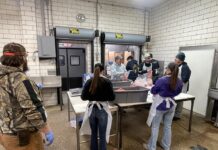DENVER – It has been more than two weeks since U.S. beef returned to Japan after an almost two-year absence, and the U.S. Meat Export Federation has wrapped up a host of market reopening activities.
Thanks. At the Hotel Okura in Tokyo, the federation’s president and CEO, Philip Seng, spoke at an appreciation luncheon arranged by the federation for those who consistently championed U.S. beef and waited impatiently for trade resumption, which happened when the Japanese government lifted its ban Dec. 12.
Seng conveyed the U.S. beef industry’s gratitude for the support shown by Japanese partners during the U.S. beef ban and expressed the federation’s intention to work closely with those partners in rebuilding consumer confidence in Japan.
Luncheon. Seng and U.S. Ambassador J. Thomas Schieffer performed a ceremonial cutting of U.S. beef to commemorate the lifting of the ban and to observe the continued, close, working relationship between the U.S. and Japanese industries.
Approximately 50 representatives of Japanese trade associations, importers, manufacturers, food-service chains and retailers sat down to a lunch of U.S. roast beef and U.S. beef tenderloin steaks prepared by Hotel Okura’s executive grand chef.
Guest of honor Tadahito Iguchi, the first everyday Japanese baseball player to win a World Series championship, also spoke at the luncheon to welcome U.S. beef back to Japan. Iguchi, a second baseman for the Chicago White Sox, has been a great proponent of U.S. beef in Japan since he enjoys eating beef in the United States.
Packing-plant tours. The luncheon capped off a whirlwind of activities for the federation since the reopening of the Japanese market, the No. 1 market for U.S. beef exports in 2003, worth $1.4 billion.
The federation helped coordinate and host visits by two teams representing Japan’s government to observe 10 different U.S. beef packing plants and other facilities that want to qualify under the U.S. Department of Agriculture beef export verification program for Japan.
U.S. beef shipments to Japan must meet certain safety conditions, including meat from cattle aged up to 20 months and the removal of specified risk material that could transmit bovine Spongiform Encephalopathy.
Media. During a visit to the Swift and Co. plant in Greeley, Colo., Japanese media were allowed to view and film portions of the audit process being observed by Japanese government officials, and the reporters were provided a rare opportunity to tour the entire plant to show Japanese consumers the steps and procedures to ensure U.S. beef is safe.
Japanese media also gathered at Yusen, an air and freight company in Denver, to send off to Tokyo the 285-pound shipment of U.S. beef for the luncheon. Seng, along with Japanese officials and media, met the shipment at Narita International Airport, welcoming U.S. beef back to Japan.
Marketing. The federation will open 2006 with a New Year’s greeting in Japan’s major newspapers that conveys a positive message of goodwill and a prosperous new year, and will work throughout the year using education, promotion and appreciation to regain Japanese consumer confidence in U.S. beef.
Get 4 Weeks of Farm and Dairy Home Delivered









